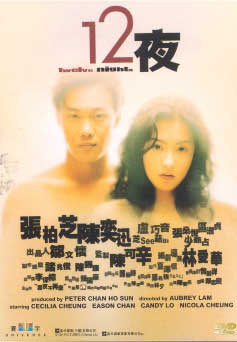

Almost about the last thing that many people -- including yours truly -- would think that a Hong Kong movie would ever (try to) resemble would be a film by someone like the late Ingmar Bergman. But then, how many people could also conceive of pretty much any film-maker (other than maybe French or Swedish ones) having done such as: Completed a Master’s thesis on “Ghosts and Goddesses: Women, Cinema and the Image” (Crystal Kwok, director and co-scriptwriter of “The Mistress”); get an article on “Postmodernism and Hong Kong Cinema” published in an academic journal that comes out of the Johns Hopkins University (Evans Chan, director of “Crossings”, “To Liv(e)” and “Journey to Beijing”; see related link #1); and cite Krzysztof Kieslowski and Edward Yang’s works as being those she most wants to imitate in a CNN-TIME interview in which she gets identified as an existentialist and a pessimist (Aubrey Lam; see related link #2)?!
TWELVE NIGHTS is fledgling director Aubrey Lam’s highly ambitious attempt to transpose Bergman’s “Scenes from a Marriage” to the milieu she knows best: I.e., not only Hong Kong but, more specifically, the Yuppie-type territory frequented by characters of the UFO (United Filmmakers Organization) films for which she -- who was the scriptwriter of six of their works (and “Purple Storm”) as well as this year 2000 Golden Harvest production -- and producer Peter Chan are famous. This having been said, this offering does not feature scenes from a troubled marital union. Instead, the temporal staged format of the Swedish auteur’s film was adopted so that viewers of this not at all technically bad Hong Kong work get shown what transpires on several obviously non-consecutive nights -- more evenings, really -- that occur over the course of a rocky relationship of two individuals who clearly -- to themselves as well as others -- do not have all that much in common. Yet persist they did, for longer than anyone probably ended up feeling was necessary, to believe that they had been destined to meet (and therefore ought to stay together).

Another comment that the film’s producer made that I found interesting -- and accurate -- is that TWELVE NIGHTS really is “a relationship movie, without being a romance.” In what does seem to be an unusually romance fixated Hong Kong film year (what with the HKSAR’s box office king being “Needing You” and even the likes of Francis Ng and Sandra Ng -- not just Sammi Cheng, Andy Lau, Kelly Chan and Richie Ren -- ending up playing love-struck characters. In this context, Wong Kar Wai’s long-awaited “In the Mood for Love” might well have the title of the year), it could have made for a nice change. However, this production is definitely not helped by its also seeming to lack passion, charm, personality, “heart” and “soul” as well as the requisite tension and action to maintain the interest of the (re)viewer. As such, what one ends up with is, to say the least, a not very happy as well as rather unusually unentertaining or not too moving -- for a Hong Kong movie (but maybe not a Swedish one?) -- viewing experience.


My rating for this film: 5
Related links:-
ASIANOW

I thought I would just add my two nickels to YTSL’s review. I was initially going to do the review for this film, but I just could not summon the energy to write about it. I am a big fan of Cecilia Cheung and was looking forward to this – but the film struck me as so lifeless and bland that I found myself completely emotionally detached from the proceedings. It was as if the director was so concerned about format and presentation that she sucks all the blood out of the characters and the story. It’s more of a clinical dissection of a relationship than a flesh and blood story. Cecilia does a fine job – and has a couple of good scenes – one a long monologue that quite impressed me – but the two main characters are simply not in the least bit interesting.
They are ordinary and dull people who make a very dull couple. This may make for a certain amount of realism (as most of us tend to be dull people who end up in dull relationships) but it certainly doesn’t make for inspired viewing. Twelve Nights felt like a lifetime to me. Just end it please. There was no reason for the two of them to be together – and both their meeting each other and departing from one another was dealt with in the most shallow of ways (though I enjoyed the symbolism of break ups occurring in convenience stores) and there was nothing in between to make you care about them.

My rating for this film: 4.0